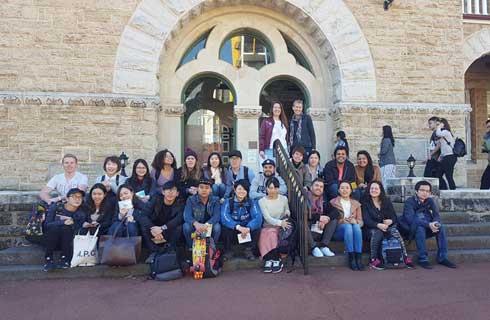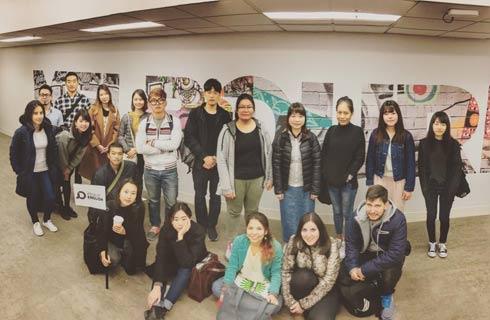PG Cert in Design for Cultural Commons

学历文凭
Graduate Certificate

专业院系
Art, Architecture and Design

开学时间

课程时长

课程学费

国际学生入学条件
an honours degree classification of 2.1/2.2 (or equivalent) in any subject discipline
practice experience in any field, with some understanding of working within NGOs or other third sector organisations.
an up-to-date CV and copies of award certificates
If your qualifications don't meet the requirements above but you have a portfolio of substantial relevant experience in the field of Commons or a similar discourse, you'll be invited to an interview to demonstrate your abilities for a postgraduate course on the Commons.
As well as the above, you'll need to present a portfolio of work or a clear proposal for postgraduate study within the subject area.
Academic IELTS
Overall score required: 6.0
Component scores required:
Listening: 5.5
Reading: 5.5
Writing: 5.5
Speaking: 5.5
Test of English as a Foreign Language Internet Based Test (TOEFL iBT)
Overall score required: 72
Component scores required:
Listening: 17
Reading: 18
Writing: 17
Speaking: 20
IDP—雅思考试联合主办方

雅思考试总分
6.0
- 雅思总分:6
- 托福网考总分:72
- 托福笔试总分:160
- 其他语言考试:Pearson Test of English (PTE) Academic<br>Component scores required:<br>Listening: 59<br>Reading: 59<br>Writing: 59<br>Speaking: 59
CRICOS代码:
申请截止日期: 请与IDP联系 以获取详细信息。
课程简介
相关申请
 预科
预科 奖学金
奖学金 实习机会
实习机会 在校学习
在校学习 跨境学习
跨境学习 校园授课-线上开始
校园授课-线上开始 在线/远程学习
在线/远程学习
开学时间&学费
学费信息仅供参考,请与IDP联系以获取详细信息
| 开学时间 | 时长 | 学费 | 地点 |
|---|
关于伦敦城市大学

伦敦城市大学提供广泛的课程,由具有行业背景、经验丰富的学术人员领导。学生还可以享受到世界一流的资源,如其价值3000万英镑的科学中心或先进的思科实验室。该大学的历史可以追溯到1848年,但伦敦城市大学是2002年由两所知名大学合并而来的。在英格兰历史悠久的首都的中心地带有两个校区,伦敦城市大学的学生受益于丰富的文化以及就业机会。位于伊斯灵顿的霍洛威校区,距离伦敦主要火车站之一的圣潘克拉斯国际火车站仅有几分钟的公共交通路程。该校区是大多数科目、设施和学生会的所在地。而艺术和设计课程则在位于肖迪奇的阿尔德门(Aldgate)校区教授,该校区距离伦敦标志性建筑塔桥只有15分钟的步行路程。无论有什么疑问、问题或担忧,伦敦城市大学都会为学生提供帮助。他们有一个来自世界各地的活跃的国际学生社区,还有专门的团队来帮助学生解决学术问题和他们的健康问题。他们还可以帮助学生解决住宿、资金、签证信息和职业指导。作为一名国际学生,伦敦是一个令人兴奋的地方。它不仅在文化上具有多样性和刺激性,而且还提供给学生大量的就业机会。
本校相关课程

BA (Hons) in Education
学历文凭
Bachelor Degree with Honours
开学日期
课程费用总额


BSc (Hons) in Public Health and Health Promotion (Top-up)
学历文凭
Bachelor Degree with Honours
开学日期
课程费用总额


BSc (Hons) in Youth Studies
学历文凭
Bachelor Degree with Honours
开学日期
课程费用总额


BSc (Hons) in Social Work
学历文凭
Bachelor Degree with Honours
开学日期
课程费用总额


BSc (Hons) Leadership in Communities
学历文凭
Bachelor Degree with Honours
开学日期
课程费用总额


BA (Hons) in Early Childhood Studies
学历文凭
Bachelor Degree with Honours
开学日期
课程费用总额

其他相关课程

品牌时装设计学士学位(加速)
 比利·布鲁设计学院
比利·布鲁设计学院学历文凭
Bachelor Degree
开学日期
课程费用总额


时装和纺织品销售副学士学位
 皇家墨尔本理工大学
皇家墨尔本理工大学学历文凭
Associate Degree
开学日期
课程费用总额


理科学士
 悉尼大学
悉尼大学泰晤士高等教育世界大学排名:54
学历文凭
Bachelor Degree
开学日期
课程费用总额


应用时装设计和销售四级证书
 西澳大利亚州职业技术学院
西澳大利亚州职业技术学院学历文凭
Certificate IV
开学日期
课程费用总额


设计学士(荣誉学位)
 斯威本科技大学
斯威本科技大学泰晤士高等教育世界大学排名:282
学历文凭
Bachelor Degree with Honours
开学日期
课程费用总额


理科学士
 斯威本科技大学
斯威本科技大学泰晤士高等教育世界大学排名:282
学历文凭
Bachelor Degree
开学日期
课程费用总额










